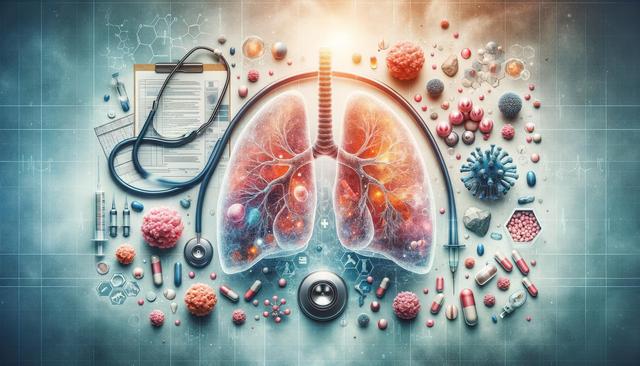Understanding the Early Symptoms of Lung Cancer
Lung cancer often develops quietly, with early symptoms that may be subtle or mistaken for less serious conditions. However, identifying the early Symptoms Of Lung Cancer can significantly improve outcomes. These early indicators may include a persistent cough that doesn’t go away, unexplained weight loss, shortness of breath, and chest pain. In some cases, individuals may experience recurring respiratory infections or a hoarse voice.
Although these symptoms can be caused by a variety of conditions, it’s important to pay attention when they persist or worsen over time. Seeing a healthcare provider for testing and evaluation is essential, especially for individuals with risk factors such as smoking history or exposure to environmental pollutants. Early detection offers more treatment options and a better prognosis.
Common early symptoms include:
- Chronic cough lasting more than three weeks
- Unexplained fatigue or weakness
- Blood in sputum (hemoptysis)
- Shortness of breath, even during mild activity
- Chest discomfort or pain
Being aware of these signs and seeking medical advice early can lead to quicker diagnosis and potentially life-extending intervention.
Diagnosis and the Role of Advanced Testing
Diagnostic procedures for lung cancer have evolved significantly, allowing for more precise and less invasive methods. One such advancement is the Non-invasive Liquid Biopsy For Lung Cancer Mutation Test. This test analyzes a blood sample to detect genetic mutations and markers associated with certain types of lung cancer. It offers a promising alternative to traditional tissue biopsies, which may be more invasive and carry a higher risk of complications.
Liquid biopsies can provide valuable insights into the molecular profile of the tumor, helping physicians tailor treatment strategies to each patient’s unique condition. They are especially useful in cases where obtaining a tissue sample is challenging or risky. These tests can also be used to monitor treatment effectiveness and detect recurrence at an early stage.
Diagnostic tools commonly used include:
- Imaging tests such as chest X-rays and CT scans
- Sputum cytology to examine mucus from the lungs
- Bronchoscopy for visual examination of lung tissues
- Needle biopsies guided by imaging
- Liquid biopsies for mutation detection
Combining these tools allows for more accurate diagnosis and a better understanding of the disease’s progression and characteristics.
Treatment Options for Lung Cancer
Lung Cancer Treatment varies depending on the type, stage, and genetic makeup of the tumor. The primary treatment modalities include surgery, radiation therapy, chemotherapy, immunotherapy, and targeted therapy. In early-stage lung cancer, surgical removal of the tumor may be the most effective option. For more advanced stages, a combination of therapies is often used to manage the disease.
Targeted therapies and immunotherapies have revolutionized the way lung cancer is treated. These methods focus on specific mutations or immune checkpoints, respectively, offering personalized treatment approaches. Patients whose tumors express certain genetic mutations—detected through tests like the Non-invasive Liquid Biopsy For Lung Cancer Mutation Test—may benefit substantially from these modern options.
Common treatment approaches include:
- Surgery to remove part or all of the lung
- Radiation therapy to destroy cancer cells
- Chemotherapy to kill or stop the growth of cancer cells
- Immunotherapy to boost the immune system’s response
- Targeted therapy for specific genetic mutations
The choice of treatment is made collaboratively between patients and their healthcare teams, taking into account overall health, preferences, and specific disease characteristics.
Living with Lung Cancer and Managing Side Effects
Managing lung cancer involves more than just treating the disease—it also includes addressing the emotional, physical, and social impacts. Side effects from treatment can vary widely, with some patients experiencing fatigue, nausea, loss of appetite, or respiratory issues. Supportive care and symptom management are essential parts of a comprehensive treatment plan.
Psychological support, nutrition counseling, and physical rehabilitation can help individuals maintain a better quality of life during and after treatment. Many cancer centers offer integrative care services, including mental health support, pain management, and lifestyle counseling, which are vital for coping with the challenges of lung cancer.
Important aspects of patient support include:
- Regular follow-ups to monitor treatment progress
- Managing side effects with medications and therapies
- Access to counseling and support groups
- Nutritional and physical activity guidance
- Palliative care when needed
Living with lung cancer is a journey that involves adapting to new routines, staying informed, and maintaining open communication with healthcare providers.
The Importance of Early Detection and Ongoing Research
Early detection remains one of the most impactful factors in improving lung cancer outcomes. Recognizing the Symptoms Of Lung Cancer and acting swiftly can lead to earlier interventions and more treatment choices. Tools like the Non-invasive Liquid Biopsy For Lung Cancer Mutation Test are playing a growing role in this landscape by making it easier to identify cancer mutations and respond accordingly.
Ongoing research continues to uncover new insights into lung cancer biology, leading to the development of innovative therapies and diagnostic tools. Clinical trials are an important part of this progress and may offer additional treatment opportunities for eligible patients.
Key advancements in the field include:
- Improved imaging technologies for early detection
- Genomic testing to personalize treatment
- Next-generation immunotherapies
- Minimally invasive monitoring techniques
- Greater access to clinical trials and emerging treatments
Staying informed about the latest developments and discussing them with healthcare professionals can empower patients and caregivers to make well-informed decisions throughout the treatment journey.
Conclusion: Empowering Patients Through Awareness and Innovation
Understanding the early Symptoms Of Lung Cancer and accessing advanced diagnostic tools like the Non-invasive Liquid Biopsy For Lung Cancer Mutation Test can make a critical difference in detection and treatment outcomes. With evolving Lung Cancer Treatment options and a growing focus on personalized care, patients today have more resources and support than ever before. Staying proactive, informed, and engaged with healthcare providers is key to navigating the complexities of lung cancer with confidence and hope.




Leave a Reply